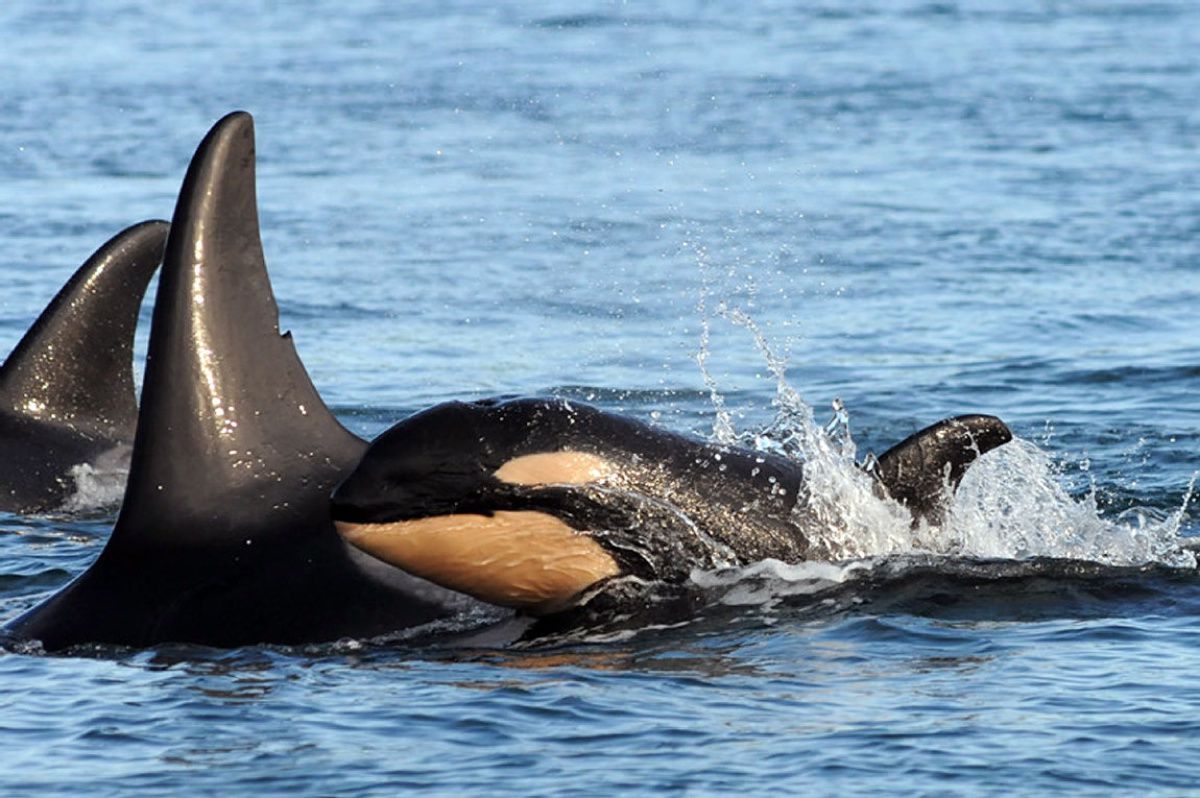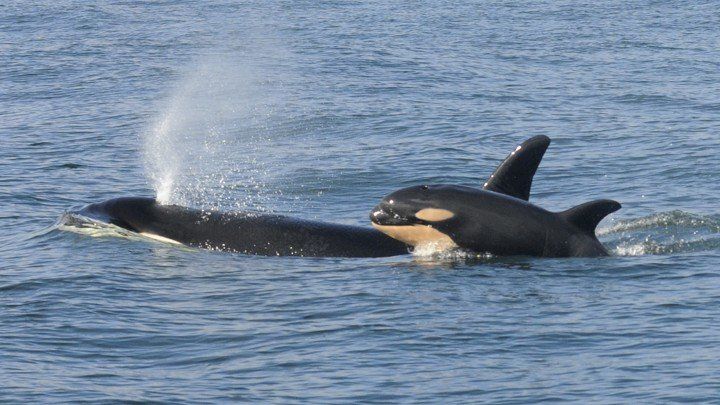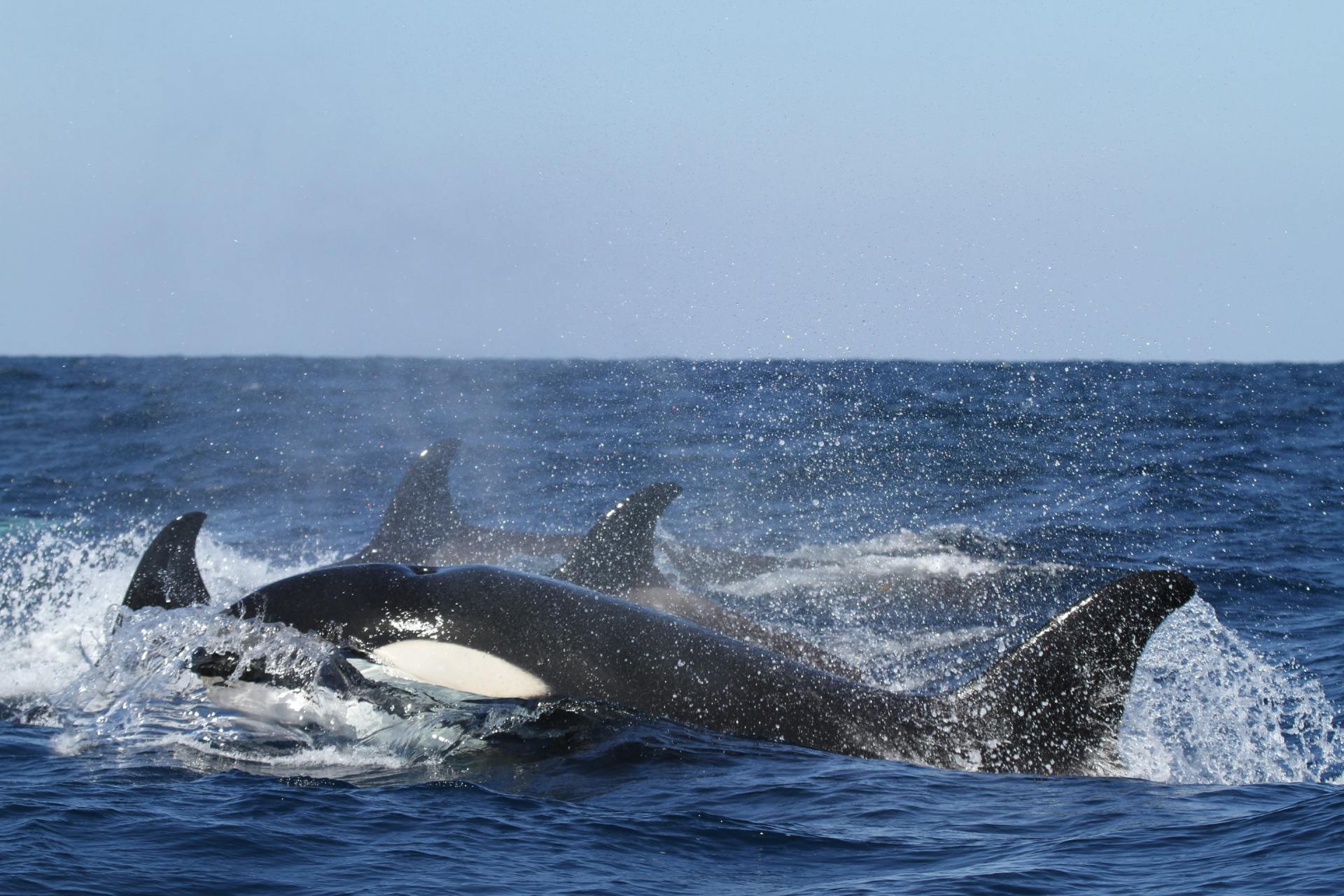Grandmother Killer Whales Increase Survival Rate of Calves!
Why humans and some species such as toothed whales go through menopause remains an evolutionary conundrum. In humans, post reproductive females gain genetic benefits by helping family members, in particular by increasing the survival rates of their grand children. Until recently little was known about why killer whales had evolved the longest post-reproductive life span of all non-human animals.
File photo from Dec. 16, 2015, provided by the Center for Whale Research, in which a new baby orca whale is seen swimming alongside an adult whale in the Haro Strait between San Juan Islands, Wash., and Vancouver Island. DAVE ELLIFRIT / AP
New research published in the Proceedings of the National Academy of Sciences of the United States of America
is helping us to understand why some female species cease ovulation, yet live for decades after they have stopped reproducing. In humans, post reproductive females increase the survival of their grand-offspring, a phenomenon known as the "grandmother effect", however until recently this has not been tested on cetaceans.
Almost all animals reproduce until they die, even very long-lived ones like elephants and blue whales ( Balaenoptera musculus
). Women usually go through menopause between ages 45 and 55, even though they may live to age 80, 90, or older. Similarly, female killer whales ( Orcinus orca
) stop reproducing in their 30's and 40's, yet can live many decades following menopause. Scientific evidence from studies in modern-day hunter-gatherer communities as well as in populations in Finland and Canada indicate that post-reproductive woman can help increase the number of children their daughters have, and boost the survival rates of their grandchildren. Dan Franks, a computer scientist and biologist at the University of York, U.K., wanted to know whether this grandmother effect occurs in other species also.
We know that some cetacean (whale, dolphin and porpoise) species go through menopause, e.g. killer whales, narwhals ( Monodon monoceros
), belugas ( Delphinapterus leucas
), and short-finned pilot whales ( Globicephala melas
). For example "Granny" a grandmother southern resident killer whale from the J pod (24 individuals), lived to be over 100 years and scientists estimate she was born around 1911, meaning she was alive when the Titanic sunk. Unfortunately "Granny" hasn't been seen since October 2016 and is presumed deceased.
"Granny's" exact age is unknown as her carcass was lost to the Northwest Pacific Ocean, however, what is known is that granny stopped reproducing long before scientists first began monitoring the population.
In collaboration with scientists from the Centre for Whale Research in Canada and the U.S., who have been studying resident killer whales since the 1970's, the researchers analysed over 36 years of data from two groups, consisting of over 700 individuals from the waters of British Columbia, Canada and Washington State, U.S. and tested the "grandmother effect" by quantifying grand-offspring survival with living or recently deceased grandmothers (while controlling for food supple availability). They showed that post-reproductive grandmothers provide significant survival benefit
to grand-offspring more than reproductive grandmothers. In fact, after a grandmother died, her grandchildren were 4.5 times more likely to die during the following two years, in comparison to other whales in the group.
After ceasing reproduction, grandmother females avoid reproductive conflict with their daughters and provide increased benefits to their grand-offspring. The benefits provided by non-reproductive grandmothers is most significant in times of limited prey availability, i.e. where salmon abundance is low to moderate. This may help explain the long life of post reproductive females in toothed cetaceans.
Just like human grandmothers who love to spoil their grandchildren with attention and treats, cetologists have shown the same may be true for killer whales. By providing young animals with some freshly caught Chinook salmon now and then, or with knowledge on where to forage for it, grannies help to increase their grand-offspring’s chance of survival. That’s likely because they either shared their catch with their grand-offspring or coordinated foraging efforts based on their memories and past experiences of limited prey availability.
The new research is the first study to provide direct evidence of the “grandmother hypothesis" in non-human animals, where grand mothers provide extra care for their grandchildren.
A female killer whale and her newborn calf . Source: Reuters.
This research agrees with existing literature on killer whale social structure where adult male killer whales benefit from staying with their maternal pod, only leaving to mate —scientists call them “mommy’s boys,” and these whales also have significantly better chances of survival.
Another studyon almost 600 killer whales showed that having mom nearby significantly increased a son's chances of survival. This was shown to be a mutually beneficial relationship due an innate drive to ensure she has as many descendants as possible, which may compel her to help her adult young.
Scientists took pictures of the whales' dorsal fins, which have unique "notches and nicks" to help identify individuals in a population—and used the images to track the birth and death rates. By 2010, the survey included 589 individuals. Biologist Darren Croft from the University of Exeter in the U.K. and his team analysed these data using algorithms similar to those used by insurance companies to calculate life insurance premiums, and came up with the probability of survival of each whale at any age. They then did separate calculations for orcas whose mothers had died and for those who still had mothers.
After a mother's death, they found sons chances of survival were decreased in comparison to daughters, and that young males were more more likely to die after their mother's death by an increase of more than eightfold. However, young daughters were 2.7 times more likely to die.
"For them, just like us, family matters", saidRobert Pitman, a marine ecologist at the National Marine Fisheries Service in San Diego, California, who was not involved with the study.
The researchers don't know why having mothers around benefits the sons more than the daughters. It could be that mothers assist in hunting or protection. In summary, the evolutionary benefit of a female keeping watch over her descendants may help explain why female killer whales, pilot whales and humans, live decades past their reproductive prime.
Matriarchal female killer whale (Orcinus orca) with young. Source: Stock Image.
© Ocean Research & Conservation Ireland (ORCireland) and www.orcireland.ie , est. 2017. If you like our blogs on the latest news in marine science and would like to support our work, visit www.orcireland.ie to become a member, to volunteer or to make a donation today.
References:
SHARE THIS ARTICLE
















